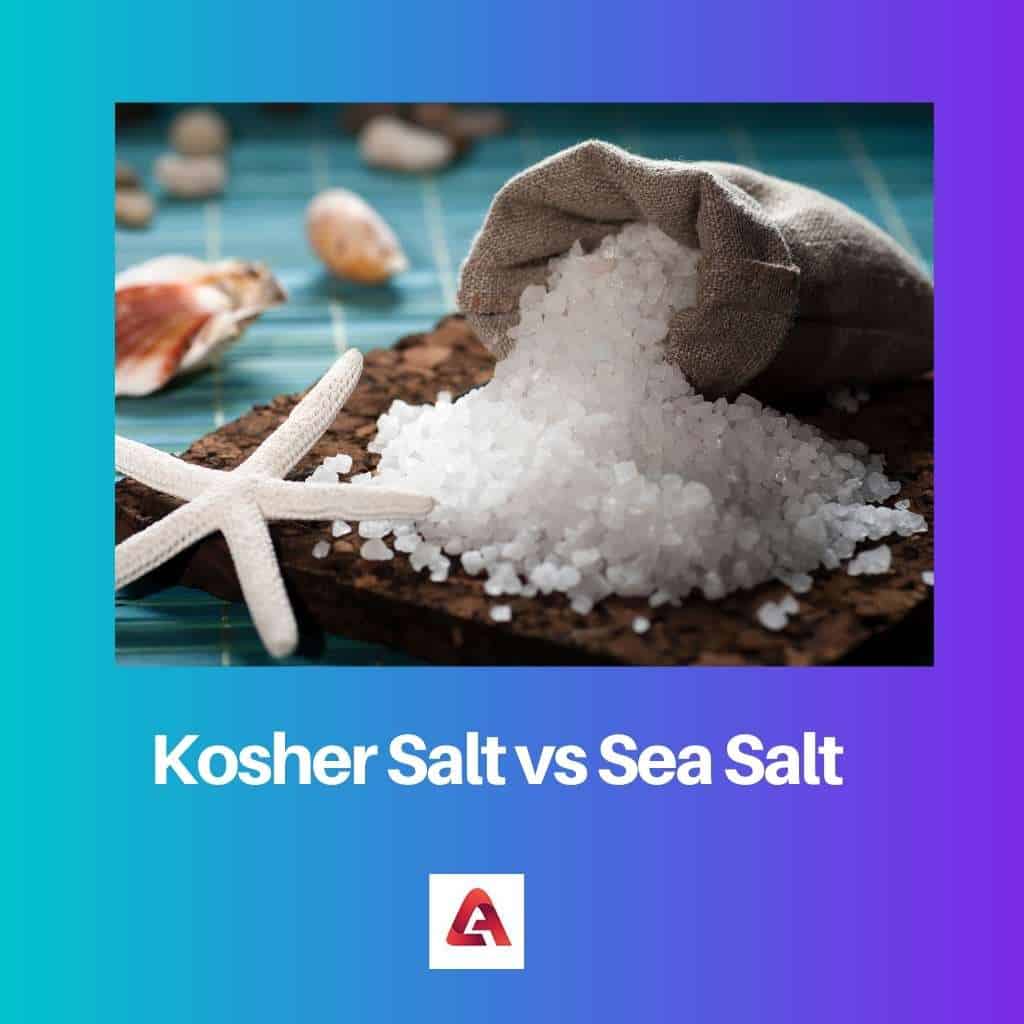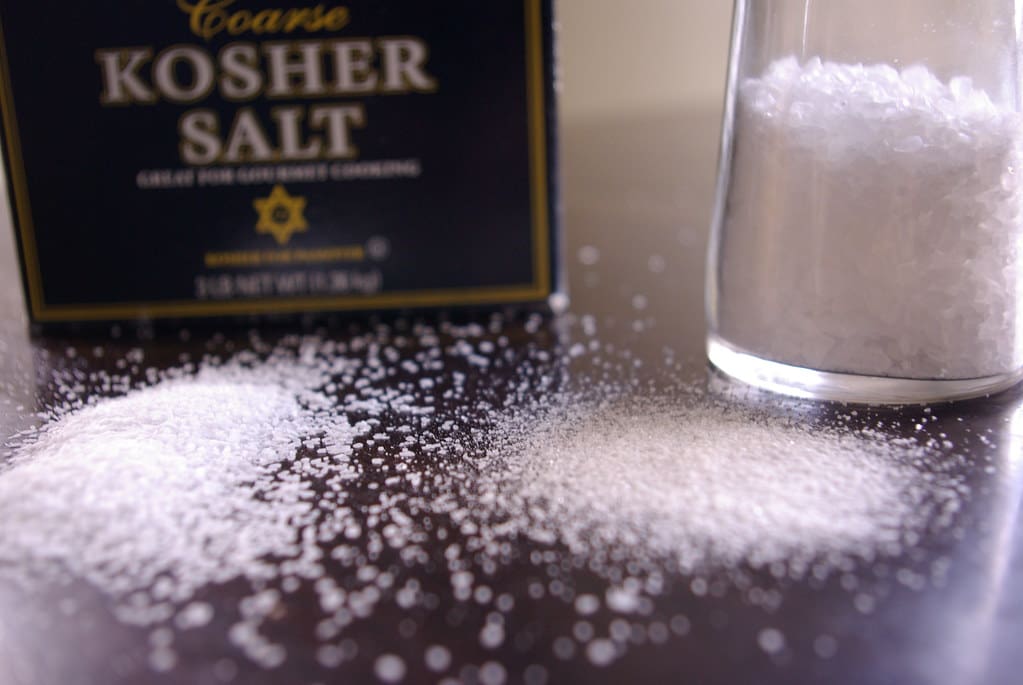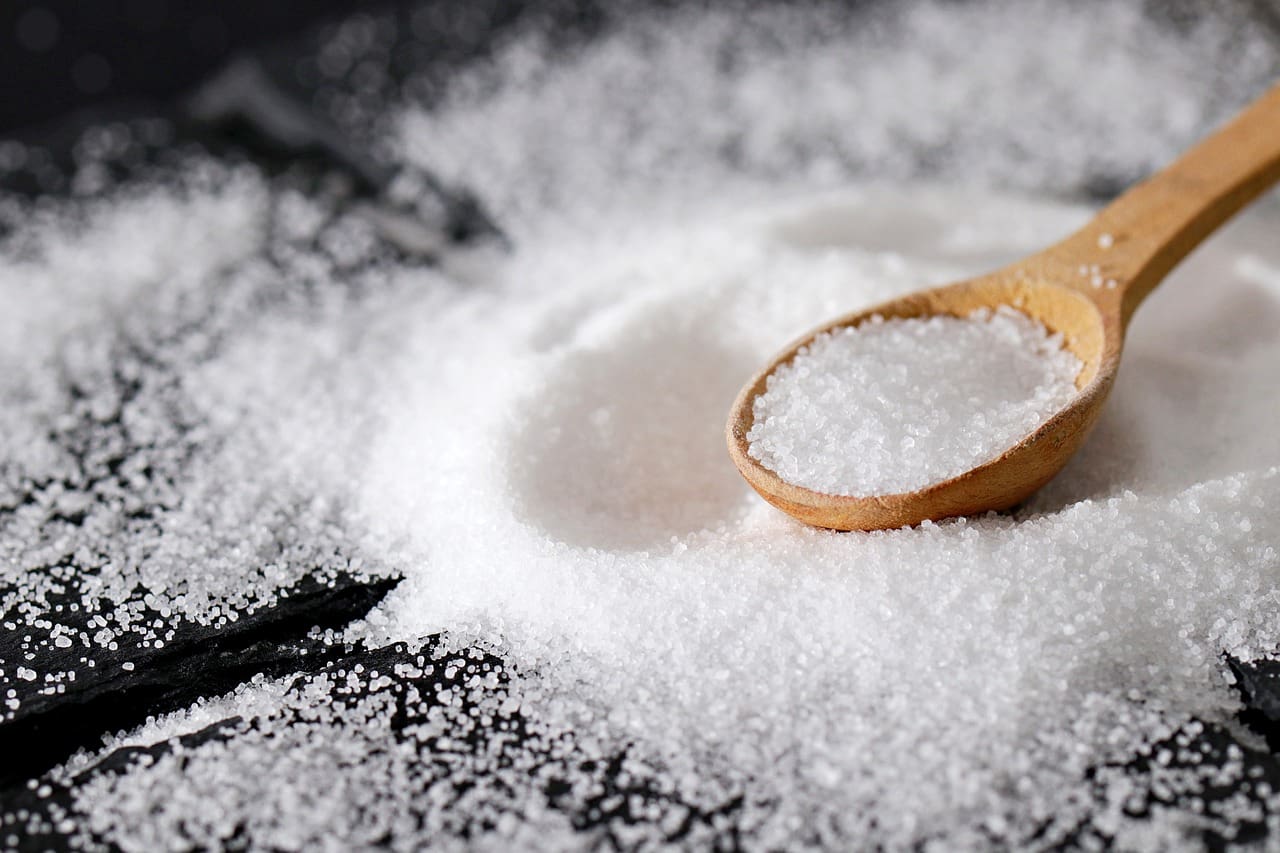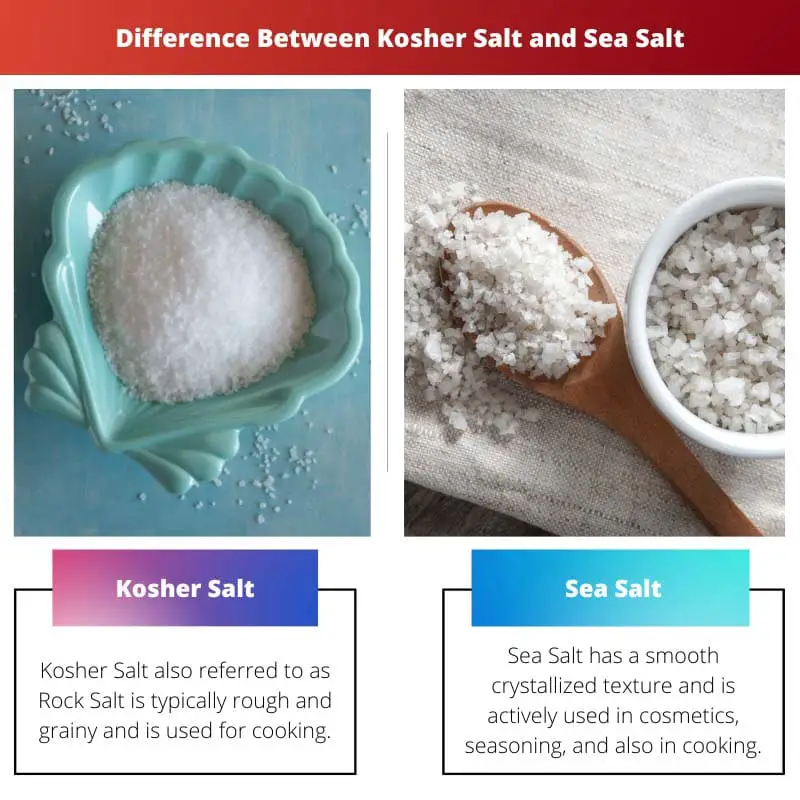Salt- the most vital ingredient of food, whose presence goes unnoticed but absence creates a huge difference in the taste.
For the unaware, there are numerous types of salt available, for instance, Kosher Salt, Sea Salt, Table Salt, etc. although chemically every salt is sodium chloride, they do differ in grain size, texture, and various other parameters.
Key Takeaways
- Kosher salt has larger, flakier crystals and less sodium per volume than sea salt.
- Sea salt derives from evaporated seawater and contains various trace minerals.
- Kosher salt is commonly used in cooking due to its easier measurement and even distribution.
Kosher Salt vs Sea Salt
Kosher salt is a coarse-grained salt that has no additives and is commonly used in Jewish cuisine. In contrast, sea salt is produced by evaporating seawater, may contain minerals that can give it a unique flavour, and is a common type of salt widely used in cooking and food production.

Kosher Salt also referred to as Rock Salt is rough and grainy and is used for cooking. It does not contain any additional additives; it is purely sodium chloride prepared by processing the salt crystals obtained from the sea.
Owing to its rough texture, it is not easily dissolved. Kosher Salt is to date one of the most widely used cooking salt.
On the other hand, Sea Salt has a smooth crystallized texture and is actively used in cosmetics, seasoning, and also in cooking. It is obtained after the evaporation of the seawater. It has other popular names like Solar Salt, Bay Salt, etc.
As it is obtained through seawater it has certain micronutrients and elements which add to its taste and composition. This is a distinguishing feature of Sea Salt.
Comparison Table
| Parameters of Comparison | Kosher Salt | Sea Salt |
|---|---|---|
| Texture | Coarse- Large grains | Comparatively Smooth- Small grains |
| Additives | Absent (May contain Anticaking agents) | Traces of elements like magnesium, potassium salts of chloride |
| Produced by | Land Salt Mines | Evaporation of Natural Seawater |
| Taste | Plain Salt | Slightly different due to the presence of micronutrients (Seawater) |
| Uses | Cooking, Food Preservation | Cosmetics, Seasoning |
What is Kosher Salt?
As mentioned above, Kosher Salt or Rock Salt is a grainy textured salt used presumably in cooking specifically in brining of meat. As it is processed salt it lacks extra micronutrients and elements which are available in the seawater.
Though it lacks iodine it may contain anticaking agents that ensure that no lumps are formed on exposure to air.
Kosher Salt got its name through a Jewish religious procedure called Brining/ Koshering of Meat (Expelling the blood out of the meat), although Kosher salt has its roots in the Jewish practices, it is used widely in the United States.
Along with these uses, Kosher Salt is also used for cleaning utensils/ kitchenware (mainly as an abrasive cleaner) and does not maintain the abrasiveness after a water-wash, which makes it different from other abrasive cleaners.
Kosher salt is the ideal cooking salt as it liquefies on sprinkling thus spreading evenly on the food ensuring a good taste. Healthwise Kosher salt is better as it contains slightly low sodium thus it actively maintains the Blood Pressure.
Two popular manufacturers of Kosher Salt are Morton and Diamond Crystal.
Morton produces Kosher Salt that is slightly coarser than other types of salts whereas Diamond Crystal produces Kosher Salt that is slightly pyramidal that has a texture coarser than Morton’s Kosher Salt.
Owing to its manufacturing procedure Kosher Salt is slightly more expensive than Table Salt. Nevertheless, to date, Kosher Salt is globally one of the most widely used Kitchen Salt.

What is Sea Salt?
Aforementioned, Sea Salt is a category of salt that is produced directly from seawater evaporation and has a smooth crystallized texture that has tremendous uses like food preservation, cosmetics. It also belongs to the class of edible salts.
As they are produced directly by the sea and are processed the least, certain micronutrients and elements are left behind in Sea Salt; these elements slightly affect the taste when used in food.
Some brands of Sea Salt also contain iodine in them. The presence of these elements for instance magnesium, calcium, potassium also affects the color of Sea Salt with colors ranging from Black, Red, Pink, Grey.
Specifically, Black and Red Sea Salts have their roots in Hawaii.
Since Sea Salt dissolves more easily than any other salt it is a perfect seasoner and is proved to provide a different mouthfeel altogether.
It is more expensive than other salts due to the meticulous procedure involved as it requires precision from all the laborers involved.
The Iodine present in Sea Salt is extremely good for health, also the micronutrients present in them enhance the nutritional benefit with no practical side effects.
Some brands also classify and sell Sea Salt based on their size; mainly 3 sizes- Chunky, Fine, and Flaky Sea Salt.
The procedures involved in preparing Sea Salt modify the texture and color of the Sea Salt, for example, the Maldon, Celtic, and Fleur de sel (Obtained from Ponds) and many varieties.

Main Differences Between Kosher Salt and Sea Salt
- Kosher Salt is also called Rock Salt or Kitchen Salt, whereas Sea Salt is referred to as Bay Salt or Solar Salt.
- Kosher Salt has a coarser texture, while Sea Salt has a comparatively smoother and fine crystallized texture.
- Kosher Salt is used for Cooking and Brining justifying its name as Kitchen Salt, on the other hand, Sea Salt is used in Cosmetics, Seasoning, etc.
- Kosher Salt contains no additives, in contrast, Sea Salt may contain traces of Iodine.
- Kosher Salt is processed in Land Salt Mines thus it lacks the natural micronutrients and elements, whereas Sea Salt is produced by the evaporation of seawater and is comparatively less processed thus it contains all the micronutrients that affect its color and taste slightly.








